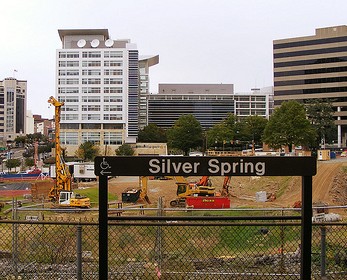
Silver Spring Transit Center Update & More
The Montgomery County Council will receive an update from the executive branch on remediation plans for the Silver Spring Transit Center at 1:45 p.m. on July 23.
The center has been delayed due to construction problems and last week, the Washington Metropolitan Area Transit Authority (WMATA—or better known as Metro) questioned the remediation plans that are being considered.
The worksession on the transit center, and the Council’s regular weekly session that will begin at 9:30 a.m., will be held in the Third Floor Hearing Room of the Council Office Building at 100 Maryland Ave. in Rockville. The morning and afternoon sessions will be televised live by County Cable Montgomery (CCM—Cable Channel 6 on Comcast and RCN, Channel 30 on Verizon). The broadcast also will be streamed through the County Web site at www.montgomerycountymd.gov. It will be repeated starting at 9 p.m. on Friday, July 26.
The Council will continue its series of informal meetings with the directors of the County’s regional service centers when they meet at 12:30 in the Sixth Floor Conference Room. That meeting is open to the public, but will not be televised.
David Dise, the county’s director of the Department of General Services, will present the status report to the Council on the Silver Spring Transit Center. Rodrigo Bitar, the associate general manager of WMATA, also is scheduled to be present. In a letter to the county last week, WMATA said that if the county proceeds with the construction remediation plans now being considered for two 10-foot-by-40-foot roadway slabs at opposite ends of the center’s second level, WMATA (which will operate and manage the center) would not be responsible for the cost of future repairs. WMATA said it believes the slabs should be demolished and completely replaced.
During the morning session, the Council is expected to take action on Bills 41-12 and 35-12 that are intended to protect roadside trees and the county’s tree canopy.
Bill 41-12, whose chief sponsors are Councilmembers Roger Berliner and Marc Elrich, would require certain applicants to obtain a permit for trimming or cutting of specific roadside trees. The bill also would create a tree replacement fund and would direct creation of regulations further specifying roadside tree work standards.
Bill 35-12 would broadly establish a fee-based program to minimize and compensate for the loss/disturbance of the County’s tree canopy as the result of development. The bill also would establish a fund that could be used for tree canopy conservation projects, including the planting of trees on private or public property.
During the morning session, the Council also is expected to take action on a resolution concerning library materials that is sponsored by Council Vice President Craig Rice. The resolution will hopefully lead to book publishers providing fair access to e-books for public libraries. Under current rules, publishers can force libraries to pay far greater fees for e-books than are paid by the general public. Publishers also can refuse to allow libraries to have access to certain publications.
The demand for e-books in the Montgomery library system, which has more than 720,000 cardholders, is increasing exponentially. There was an 88 percent growth in e-book checkouts between 2010 and 2011 and an 87 percent growth in demand between 2011 and 2012. During the Fiscal Year 2014 operating budget process, the Council added $300,000 to address customer demand for e-books.
However, Montgomery libraries—like libraries around the nation—are being severely hampered by the actions of the book publishing industry. According to the March 4, 2013, pricing comparison from the Douglas County, Colo., library, which compiles such statistics monthly, the top book on the New York Times fiction best seller list is unavailable to libraries in e-book format. Nine of the top 15 books on the fiction list are not available to libraries as they are to consumers. The No. 5 fiction book, A Week in Winter, by Maeve Binchy, costs libraries $80.85 to license, while consumers pay $12.99 for the same book.
The resolution urges the Maryland General Assembly, the U.S. Congress, the U.S. Department of Justice and the Federal Trade Commission to examine this issue and seek any appropriate remedy so that library users will have access to materials in a reasonable and non-discriminatory manner.

Engage us on Facebook
Follow us on Twitter
Tweets by @mymcmedia